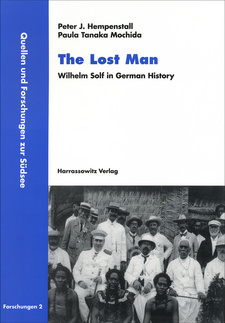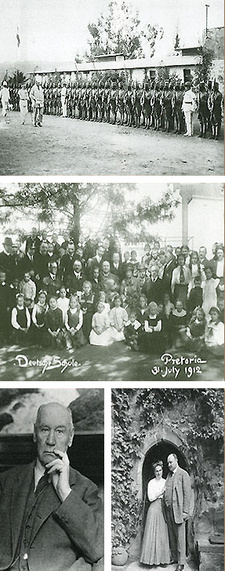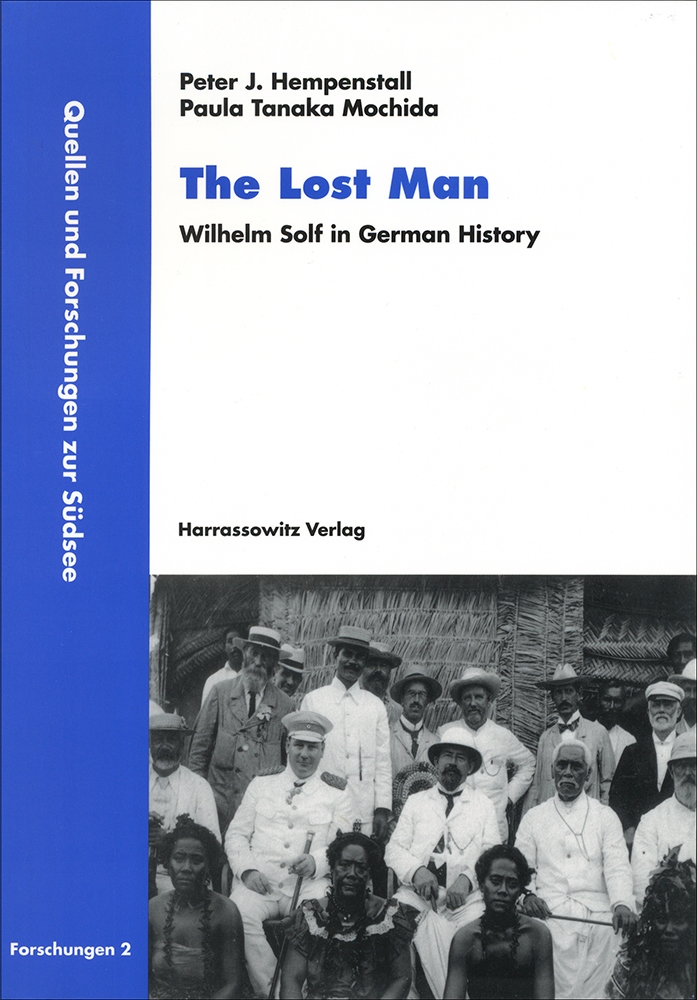The Lost Man. Wilhelm Solf in German History, by Peter J. Hempenstall and Paula Tanaka Mochida

The Lost Man. Wilhelm Solf in German History, by Peter J. Hempenstall and Paula Tanaka Mochida. Editor: Hermann Joseph Hiery. Series: Quellen und Forschung zur Südsee. Reihe B: Forschung 2. Harrassowitz Verlag. Wiesbaden, Germany 2005. ISBN 3447051345 / ISBN 3-44-705134-5 / ISBN 9783447051347 ISBN 978-3-44-705134-7

Images from The Lost Man. Wilhelm Solf in German History, by Peter J. Hempenstall and Paula Tanaka Mochida.
The substance of Wilhelm Solfs life in 'The Lost Man. Wilhelm Solf in German History' by Peter J. Hempenstall and Paula Tanaka Mochida, is told in chapters written by one or the other author, then subjected to critical scrutiny and amendment by the other in order to make the phases and writing mesh together.
In the history of colonial empires in the Pacific Islands during the early twentieth century, Wilhelm Solf is a hero. As governor of Germany's tiny, but highly valued colony of Samoa he has been set apart from the normal run of European adventurers. While French military governors harass and fence in their colonial subjects and the English erect caste barriers between themselves and the colored world, indeed while his compatriots in Africa shoot and hack their way into power, Solf demonstrates in the eyes of historians that respect for native cultures, participation in their rituals and persuasion rather than force can deliver peace and economic development. Wilhelm Solf is highly visible in the history of the Pacific, his reputation solid, only the light and shade varying in retelling his heroic tale. But outside the Pacific, and in the renderings of Germany's past during the nineteenth and twentieth centuries he is invisible, lost to all intents and purposes in the shadow of the behemoths that stalk German history - the Third Reich of the Nazis, and the Sonderweg that supposedly led directly to it. Wilhelm Solf went from carving out a name for himself as a liberal - and successful - colonial governor during a period when Germany's colonial empire was known more for its military brutality, to becoming virtually the imperial colonial minister of the Kaiserreich before World War I. During the war he struggled to influence the Kaiser's imperial circle away from its aggressive military policies towards a negotiated peace, rising to the position of last State Secretary of the Foreign Office, in effect Foreign Minister, of the Kaiser's Germany. Wilhelm Solf's fortunes sank with the declaration of the Weimar Republic, but he did not sink without trace. He became Weimar's ambassador to Japan and enjoyed a decade of resurrection as the Republic's most successful and cultured diplomat overseas, restoring the relationship between the two former enemies. On his return to Germany in 1929, already sixty-six years old, Wilhelm Solf became involved with several political attempts to forestall Hitler's rise to power, his last years he and his family became involved against Nazi anti-Semitic policies and were identified with liberal opposition groups. After Solfs death his wife, Hanna, and daughter, Lagi, continued this work and almost paid for it with their lives during World War II. Despite this personal history, if Solf is noticed at all it is to relegate him to the periphery of more important circles of actors and to dismiss his influence. It was this disjunction in the historiography that provided the thrust for this biography. We came to the life of Wilhelm Solf through thirty years of separate attraction. Peter learned about him as a graduate student exploring Germany's colonial empire in the Pacific, Paula as a Masters student in education, drawn to his internationalism, his scholarship in Asian languages and religion, and his anti-Nazi activities. It led to a correspondence. [...]
This is an excerpt from The Lost Man. Wilhelm Solf in German History, by Peter J. Hempenstall and Paula Tanaka Mochida.
Title: The Lost Man
Subtitle: Wilhelm Solf in German History
Authors: Peter J. Hempenstall; Paula Tanaka Mochida
Editor: Hermann Joseph Hiery
Series: Quellen und Forschung zur Südsee. Reihe B: Forschung 2
Publisher: Harrassowitz Verlag
Wiesbaden, Germany 2005
ISBN 3447051345 / ISBN 3-44-705134-5
ISBN 9783447051347 ISBN 978-3-44-705134-7
Softcover, 24 × 17 cm, 285 pages, 13 b/w-photos
Hempenstall, Peter J. und Mochida, Paula Tanaka im Namibiana-Buchangebot
The Lost Man. Wilhelm Solf in German History
The Lost Man is a new and innovative biography and portrays the life of Wilhelm Heinrich Solf (1862-1936).

